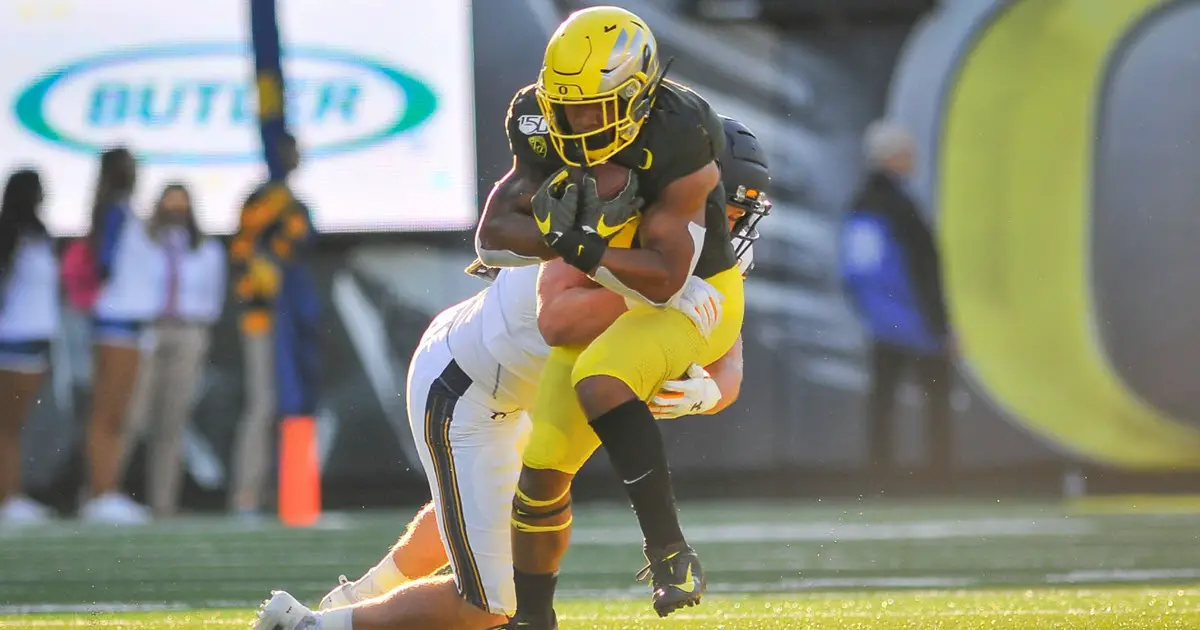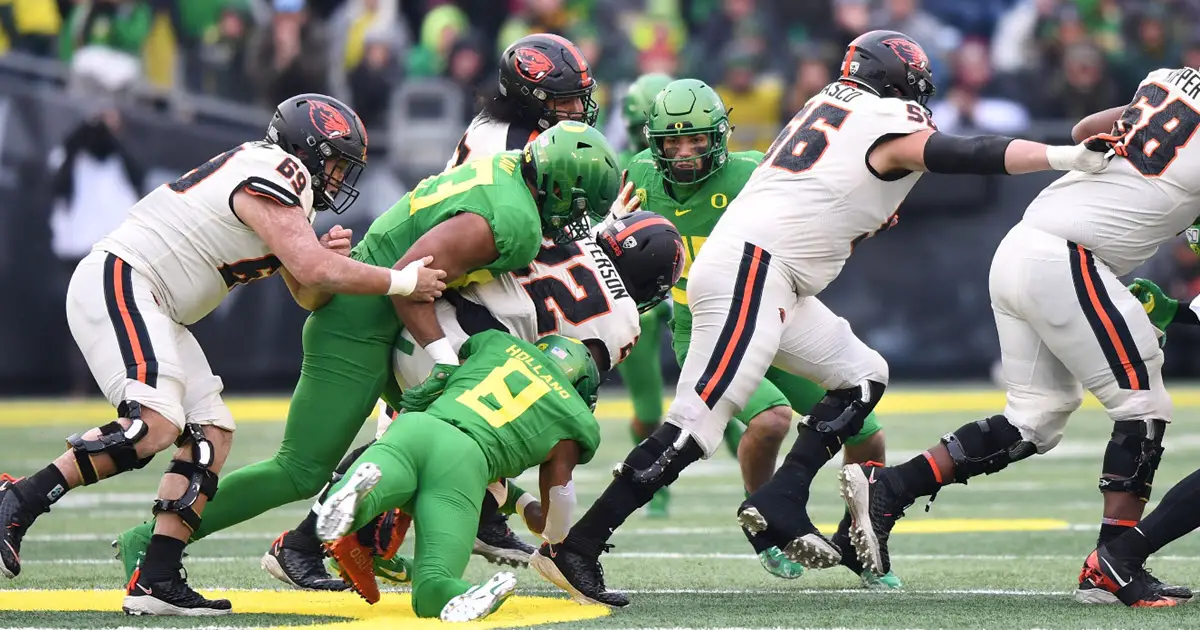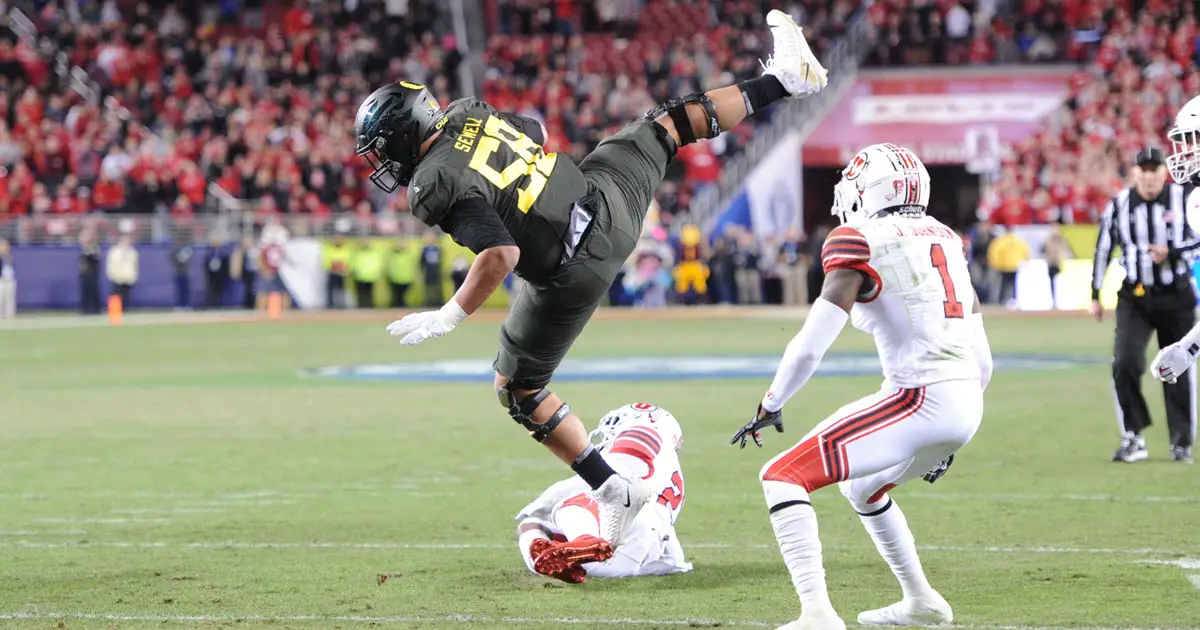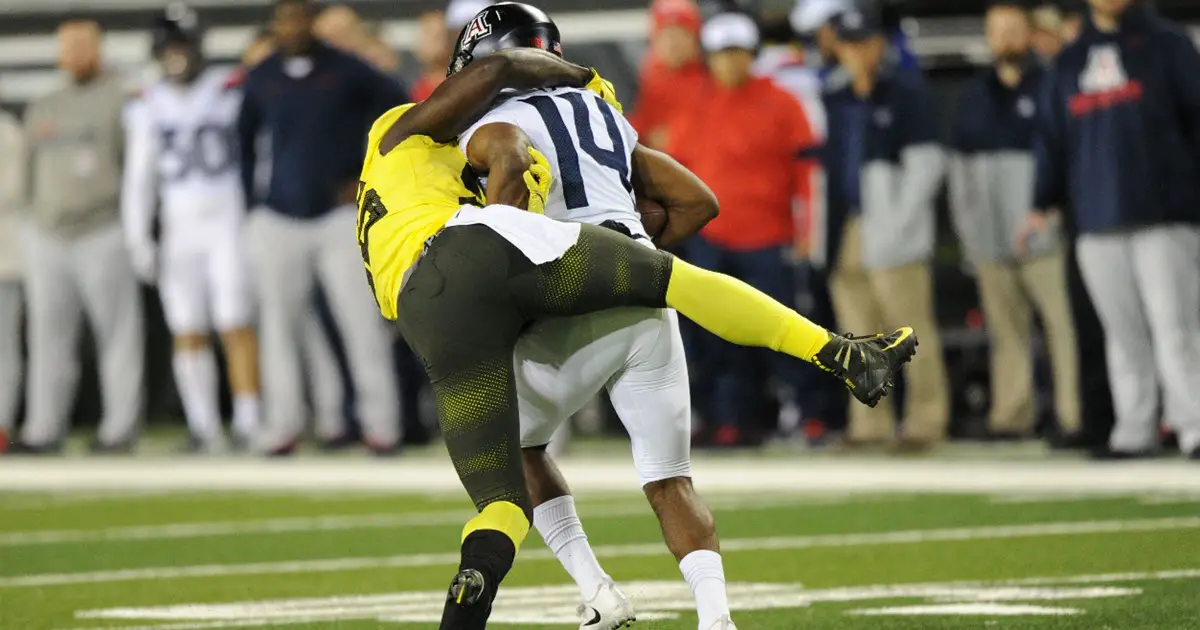2016 was the last year the Oregon Ducks fielded an elite offense. Justin Herbert was one of the best QBs in Oregon history, but constantly finding himself in shootouts kept the young player from achieving greatness in his inaugural season.
UO’s era of elite offense started in 2007 when Dennis Dixon had the Ducks on the precipice of the BCS National Championship before getting injured, and it came to a close at halftime of the Alamo Bowl against TCU in 2015.
That same period of time also saw the Ducks in one of the worst defensive periods in their long history. It often wasn’t for a lack of scheme or talent, but of exhausted defenses playing 2/3 of every game because the offense either scored quickly or went three and out. Nick Aliotti was the defensive coordinator for most of this time, and his revolutionary approach of “platoon swapping” entire units of the defense to stay fresh is still used today. Despite his best efforts, the Ducks often found themselves on the bad end of big scoring outputs from opposing teams — even in wins.
The poor defenses came to an end with the firing of Mark Helfrich and his entire staff following the 2016 season. Oregon brought in a new, talented defensive coaching staff, slowed the offense down, and — most importantly — they started to recruit defensive players with the same attention with which they recruited offensive players.
The Offense Declines

The Cal Bears held the Ducks to only 17 points in 2019, a season low.
In 2016 the Ducks ranked 5th in points per game at a whopping 43 points. Surprisingly, this led the Ducks to several close losses with a porous defense. The following year, Oregon fell to 27th in scoring offense at 35 points per game. The swift decline under the gulf coast offense was due in large part to Herbert’s injury. Backup QBs Braxton Burmeister and Taylor Alie were clearly not prepared to play any significant minutes, and the Ducks ended their historic streak of scoring 20+ points in every game.
The following year under first-year head coach Mario Cristobal, the Ducks averaged slightly better at 36 points per game, but lopsided wins early in the season boosted those numbers. OC Marcus Arroyo took a significant amount of criticism, but the issues with the receiving corps were years in the making and the Ducks led the conference with more than 50 dropped passes.
In 2019 and Year 2 under Cristobal, Oregon held steady at 35.4 points per game, with an injury riddled receiving corps and lackluster running game as the major culprits. The Ducks were held under 20 points only once, but inconsistent game planning saw many of those games score in the low to mid 20s — a stat that would have been a death sentence in the previous era.
The swift decline of the offense had many factors, from inconsistent coaching to one of the worst receiving groups in the country for two years, but the offense looks promising moving forward. The unit was never bad, per se, just inconsistently good. With the addition of Joe Moorhead, the unit may be primed to reclaim its place as one of the premier units in the country in 2020.
The Defense Rises

Opposing teams had trouble running the ball against Oregon in 2019.
In 2016 the Duck defense never got going under Brady Hoke and the unit stumbled to a No. 126 ranking in points allowed per game. A pass defense that seemingly couldn’t cover anyone, a run defense that didn’t seem to understand its new scheme, and an entire defense that couldn’t tackle anyone? The Ducks were lucky their potent offense was able to win four games.
Jim Leavitt came to Eugene as DC with high expectations in 2017. The veteran coach had helped turn Colorado, a routine bottom dweller, in to a defensive powerhouse in only two seasons. His defense, led by mostly underclassmen, improved to 81st in scoring defense, lowering their points allowed by almost two touchdowns per game. In Year 2 under Leavitt the unit allowed only 25.4 points per game, good for 49th nationally.
The Ducks had started to recruit defenders at an extremely high level. With the additions of Kayvon Thibodeaux and Mase Funa on the defensive side of the ball, the Ducks looked primed for an explosive third season under Leavitt. But with mounting discontent from Leavitt at not being named head coach following the departure of Willie Taggart, the defensive coordinator departed the program and was replaced by Boise State standout defensive coordinator Andy Avalos.
Avalos brought a fantastic scheme, phenomenal defensive game planning, and a ferocity to the Oregon defense that fans had never seen. Avalos finished his first season with the No. 9 ranked defense in the country, and added the top two middle linebackers out of high school plus one of the top cornerbacks out of high school. After allowing fewer than 20 points per game in 2019, a feat not achieved by the Ducks during the lifetimes of any of their players, the Ducks look poised for potentially their best defense in history in 2020.
Conclusions

The Ducks’ most impressive offensive game plan of the season was in the Pac-12 Championship.
The Oregon offense was a force to be reckoned with in the 2010s, but petered out toward the end of the decade. Several strong recruiting classes and the addition of a top tier offensive coordinator have set the Ducks up for success in the 2020s.
The Duck defense started the 2010s just getting by, followed by a massive decline in the middle of the decade, only to rebound into one of the best units in the country at the end of it all. Four five-star recruits in the last two recruiting cycles, as well as several highly-ranked four stars, give the Ducks one of the most talented units in the country moving forward. As long as they live up to the hype, the Oregon defense will be one of the best groups in the nation beginning this season.
Ryan Robertson
Yuma, Arizona
Top Photo by Tom Corno

Natalie Liebhaber, the FishDuck.com Volunteer Editor for this article, works in the financial technology industry in Bozeman, Montana.
Ryan Robertson is a defense contractor for the United States Marine Corps. A lifelong Duck fan from Grants Pass, he joined the Army out of high school. After four years as an Intelligence Analyst he decided it was time to further his education and pay more attention to his Ducks. One of Ryan’s first memories is of watching the Ducks, led by Joey Harrington, beating up on the Utah Utes in 2001. His grandfather ran track at Oregon in the ‘50s. He loves the Ducks, and has a passionate interest in reading every scrap of analysis centered around the football team.


